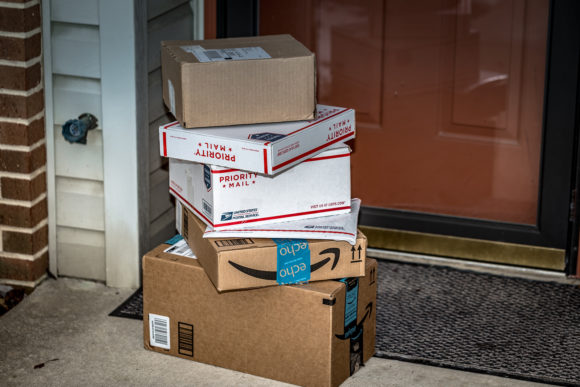One consequence of America’s Cyber Monday shopping binge is the imminent arrival of $9.4 billion worth of merchandise on the nation’s doorsteps. And that will cue the annual cries of frustration about porch pirates — along with a raft of local news stories on how to evade them, and a few viral tales of consumers attempting to spook them with booby-trapped packages or glitter bombs.

The fixation on thwarting porch pirates is understandable. (I, for one, will confess to being irrationally angry recently when a $27 baby onesie was swiped from my front stoop.) But it is also a flawed way of thinking about a legitimate and persistent problem with e-commerce.
The problem is not just theft. It is that shipping giants such as United Parcel Service Inc. and FedEx Corp., as well as big retailers, are not moving fast enough to make delivery of online orders more flexible and to turn over more control to shoppers.
Consumers and neighborhood associations should spend less time trying to answer the question, “How can we create a world where expensive goods can sit on my doorstep for hours and not get stolen?” Instead, they should be asking, “How can we make it so that expensive goods are not left on my doorstep in the first place?”
UPS and FedEx, to be fair, have made strides toward giving customers more options. Each has a network of thousands of access points where shoppers can pick up packages, including at ubiquitous stores such as Dollar General or CVS Pharmacy. Both shippers have apps that allow residents to provide delivery instructions for a driver.
Retailers, too, are getting more creative. Amazon.com Inc. now offers the option of choosing a single day each week for all of your recent orders to arrive, making it easier to ensure you’ll be home when your haul is delivered. And both Amazon and Walmart Inc. are piloting services that rely on smart-home technology that allows a driver one-time, secure access to your home.
Surely such a service, or some variation of it, will become commonplace within a decade. (After all, there was once a time when it was creepy to get in a stranger’s car, but thanks to Uber and Lyft that’s now ordinary.) For now, though, the choices for consumers are underwhelming or confusing — or, in some cases, both.
For example, UPS and FedEx both trumpet the convenience of letting you reroute an in-progress shipment to an access point. But online shoppers aren’t able to fully take advantage because retailers can put restrictions on packages preventing the recipient from redirecting them. This is likely a well-intentioned anti-fraud tactic, but it means access points aren’t the reliable solution they’re cracked up to be.
And retailers aren’t always great at steering customers toward desirable secure options. Amazon, for example, routinely tries to nudge me at checkout to try a pickup point that is a 30-minute drive from my home, even though there is a Whole Foods Market with Amazon lockers in walking distance.
But there are bigger ideas that could do even more to ensure package security. What if UPS or FedEx were to more routinely provide narrower time windows for drop-offs, or to allocate more workers for nighttime deliveries when nine-to-fivers are likely to be at home? What if retailers allowed customers to choose their shipping provider at checkout, which might force shippers to compete for their loyalty?
Such changes would further complicate the “last-mile” delivery challenges the industry has been addressing for decades, and would likely add costs. But these are the same logistics experts and retailers that were able to make speedy two-day delivery standard. It’s not unreasonable to expect them to innovate their way to giving shoppers more choice.
Even if it’s difficult, improved delivery flexibility is a far better remedy for porch piracy than other headline-grabbing approaches. Police departments have experimented with planting bait packages on doorsteps that are outfitted with GPS trackers, potentially allowing them to catch individual thieves. Texas has a new law on the books that makes package theft punishable by up to 10 years in prison.
Never mind that there are already laws against theft. These kinds of punitive measures are not useless, but they are likely to be helpful only in a limited area for a limited period of time.
The more productive approach is to focus on reducing the unsecured supply of porch treasures. And no one is better equipped to attack that problem than the retailers and shippers. So shoppers should raise their expectations of these companies and demand that they do more.
Was this article valuable?
Here are more articles you may enjoy.


 AI Claim Assistant Now Taking Auto Damage Claims Calls at Travelers
AI Claim Assistant Now Taking Auto Damage Claims Calls at Travelers  Asbestos Lawsuits Prompt Vanderbilt Minerals to File Bankruptcy
Asbestos Lawsuits Prompt Vanderbilt Minerals to File Bankruptcy  Besieged Berkshire Utility Tries to Rewrite Who Pays for Wildfires
Besieged Berkshire Utility Tries to Rewrite Who Pays for Wildfires  Stellantis Weighs Using China EV Tech for Affordable Cars
Stellantis Weighs Using China EV Tech for Affordable Cars 